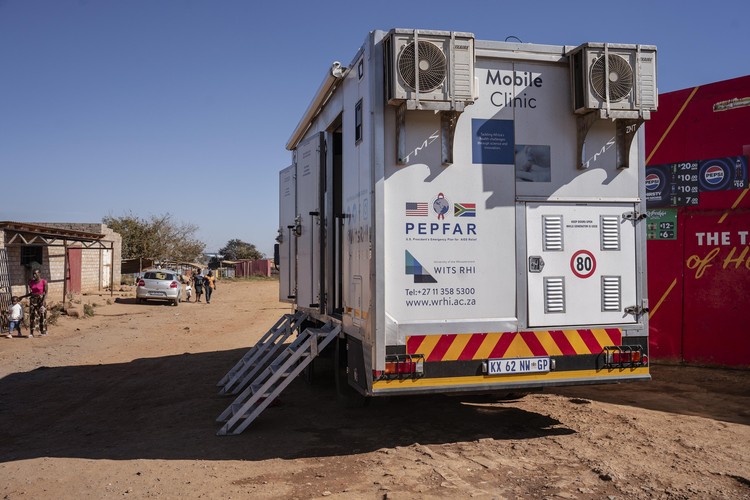PEPFAR cuts leave clinics short of staff
Survey finds longer waiting times for ARVs
Cuts in the United States President’s Emergency Plan For AIDS Relief (PEPFAR) funding in February have left clinics short of staff, a survey has found. Archive photo: Ihsaan Haffejee
A health monitoring organisation has found that in areas with a high number of people with HIV, US funding cuts have led to staff shortages and overburdened clinics.
The cuts in the United States President’s Emergency Plan For AIDS Relief (PEPFAR) in February this year have created a massive shortfall in funding to South Africa’s HIV programmes. After several months, the National Treasury agreed to fund about R753-million to cover some of the shortfall. (Measuring the total PEPFAR shortfall is complicated, but it is roughly R7-billion.)
A report by Ritshidze over three months shows that PEPFAR cuts to HIV programmes have led to reduced staff and longer waiting times for ARV medicines.
Ritshidze is a South African community-led clinic monitoring organisation. From April to June this year Ritshidze monitored over 325 facilities in 16 districts across six provinces. Most were PEPFAR-priority districts or formerly PEPFAR-supported districts where contracts have been cut. Thousands of patients and people living with HIV were surveyed, as well as staff at the clinics.
Nearly half the staff surveyed reported that capacity in clinics had been reduced, because PEPFAR-funded health workers were not working there anymore or were working less. 85% of managers reported that their clinics faced staffing shortages, though only one in five blamed shortages on PEPFAR staff cuts.
Patients surveyed also reported challenges with staffing at clinics. Over 60% reported that there were too few staff. These shortages have got worse since PEPFAR cuts.
The worst-performing districts from patient reports on staff shortages were Johannesburg, and three Free State municipalities: Lejweleputswa, Mangaung, and Thabo Mofutsanyana.
The surveys also found that waiting times in several districts have increased due to staff shortages. A fifth of healthcare users said that waiting times were longer than usual. This was particularly bad in the Mangaung district (with 72% saying waiting times were longer), Buffalo City (34%), and King Cetshwayo in KwaZulu-Natal. About 35% of people said it took longer to collect ARVs since February.
The report also found that disorganised filing systems frequently caused delays and increased waiting times.
Staff reported that HIV testing has been hit. 20% of surveyed staff said that following PEPFAR cuts, there were fewer staff to provide HIV testing or not enough test kits were available.
Ritshidze said with less HIV testing, it becomes harder to identify people with HIV who need to start or restart treatment. There are about 1.1 million people with HIV who are not receiving treatment, according to the health department.
TAC and Ritshidze have recommended that people be given a six-month supply of ARVs in all provinces. Currently patients get a one- or three-month supply.
Health department spokesperson Foster Mohale had not responded to a request for comment by the time of publication.
Support independent journalism
Donate using Payfast

Don't miss out on the latest news
We respect your privacy, and promise we won't spam you.
Next: Unemployed young people protest in Nigel, demanding jobs
Previous: Winning lottery bidder’s connections to Paul Mashatile being probed, says Minister Tau
Letters
Dear Editor
The report on the staff shortages and overwhelming patient waiting times caused by the PEPFAR cuts is not a story about American politics; it is a shameful mirror reflecting our own government's failure of moral priority.
For the government to have relied so heavily on an external donor for the core of our national HIV/AIDS response – a constitutional mandate for healthcare – is nothing less than negligence. The R7-billion shortfall proves the state has been treating the well-being of its citizens as a charitable subsidy, not a domestic, non-negotiable expense.
Now, the consequences are measured in human dignity: patients are waiting longer for the ARVs that keep them alive, and vital HIV testing is collapsing. The 60% of patients reporting staff shortages is a statistical proof that the right to health is being arbitrarily suspended.
We cannot accept excuses. The government must be held to account for this collapse, and the fix is structural, not a temporary bandage:
Stop the Congestion: Immediately adopt the recommendation to move all stable patients to a six-month ARV supply. This is a simple administrative measure that will instantly reduce the burden on our collapsing clinics.
Budget for Life: National Treasury must publish a clear, multi-year plan to fully domesticate the HIV budget. This life-saving funding must be phased out of foreign reliance and secured as a core, non-negotiable line item in the MTEF.
Digitize and Decentralize: End the delays caused by "disorganised filing systems" by investing in low-cost digitization and shifting collection to community pharmacies. This allows clinic staff to focus on actual care, not paper management.
The government must treat the health of its people with the same urgency as it would a national security threat. We demand accountability now.
© 2025 GroundUp. This article is licensed under a Creative Commons Attribution-NoDerivatives 4.0 International License.
You may republish this article, so long as you credit the authors and GroundUp, and do not change the text. Please include a link back to the original article.
We put an invisible pixel in the article so that we can count traffic to republishers. All analytics tools are solely on our servers. We do not give our logs to any third party. Logs are deleted after two weeks. We do not use any IP address identifying information except to count regional traffic. We are solely interested in counting hits, not tracking users. If you republish, please do not delete the invisible pixel.

